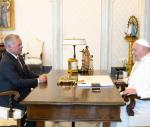You are here
Costs, rewards of the battle for Mosul
Oct 18,2016 - Last updated at Oct 18,2016
Finally, two years after its dramatic fall and following months of preparation marred by squabbles, inner divisions and foreign pressures, Iraqi Prime Minister Haidar Al Abadi on Monday gave the go-ahead for an extensive military operation to retake Mosul, Daesh’s last major stronghold in Iraq.
It promises to be a long and complex battle, especially as Iraqi forces close in on the city’s neighbourhoods and centre.
For Daesh, it is an existential war following a succession of recent territorial losses.
For the Baghdad government, it is a battle that will decide its future amid internal struggles to salvage a political system that most Iraqis loathe.
For the US-led coalition, the liberation of Mosul will go a long way in stemming
criticism that the Obama administration acted too slow, and sometimes without a clear strategy, to crush a dangerous enemy that threatens the region and the world as a whole.
For now, it looks like US pressure on Abadi — and Turkish warnings — succeeded in neutralising the controversial Iran-led Popular Mobilisation Units (PMU).
Iraqi army and special anti-terrorism forces are taking the lead in the current operation. They are assisted by Kurdish peshmerga fighters, while the US-led coalition is providing air cover, logistical support and war room advice.
The first 24 hours delivered signs that Daesh fighters were giving up territory and retreating towards the heart of Mosul.
Judging from previous confrontations between the two sides, the biggest concern will be for the safety of an estimated 1.5 million residents of the city, the second largest in Iraq.
It is the civilian cost that will finally determine the degree of success, or failure, of this operation.
Daesh fighters, estimated to number 4,000 to 8,000, have no qualms about using civilians as human shields.
Civilians will be caught between the two sides and if Daesh resorts to mining houses and public buildings, as it did in Ramadi and Fallujah, the level of destruction of the city will be enormous.
The battle could be over within weeks if Daesh command and control infrastructure is hit hard and fighters begin to desert en masse, as some observers predicted.
And it could take months, raising the humanitarian stakes and proving to be costly for all sides.
One thing is clear: the longer this battle lingers on, the higher the political price for Abadi.
The question for now is how long can he keep a steady hand and run this offensive while keeping the Iranians, the PMU and the Turks at bay?
Mosul’s demographic, economic and geographical characteristics make it a significant prize for the Baghdad government, but also for the Kurds, the Turks and even the Iranians.
It sits in the heart of a contested oil-rich region where the Kurds have made a number of claims.
For Turkey, which has rebuffed requests by Abadi to withdraw its troops from the nearby Basheeqa military base, preventing the PMU from entering and looting the Sunni majority city is a strategic objective.
Ironically, and despite recent tensions, both Ankara and Baghdad are worried about Kurdish territorial claims in the Mosul area, for different reasons.
In the case of the United States, the main goal of the latest offensive is to deal a terminal blow to Daesh in Iraq. President Barack Obama is keen on declaring victory against the terrorist group before he leaves office in January.
A triumph in Mosul, which will cut land routes between the city and Daesh-controlled Tel Afar, on the Syrian border, will boost efforts to retake Raqqa in Syria in the coming weeks.
Once Mosul is liberated, major political challenges will have to be overcome.
Abadi must convince the Kurds to withdraw from the city and territories they occupied in the Nineveh province. But that is easier said than done.
He must also gain the trust of Iraq’s Sunnis and the city’s residents by speeding up the process of repatriation of displaced families and rebuilding of Mosul.
Tens of thousands of people in and around Mosul had to flee their homes since Daesh took over. Tribal leaders warned of sectarian acts of revenge against the city’s residents who the PMU might accuse of collaborating with Daesh.
The recapture of Mosul will prove to be an important milestone in Iraq’s post-US invasion history.
It should bring to the forefront critical issues that challenge modern-day Iraq, from US and Iranian influence over the political system to the country’s deepening sectarian divisions, and from the failures that plague the corrupt system of government to the separatist tendencies of Iraqi Kurds.
As the dust settles after the battle of Mosul, Iraqis will have to face and tackle the existential challenges that have ripped their country apart.
The writer is a journalist and political commentator based in Amman.













